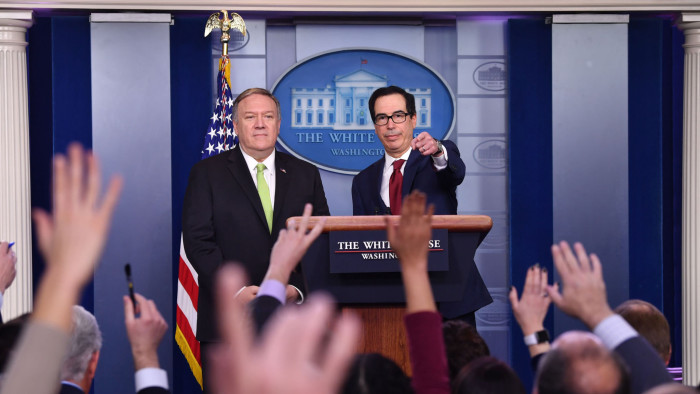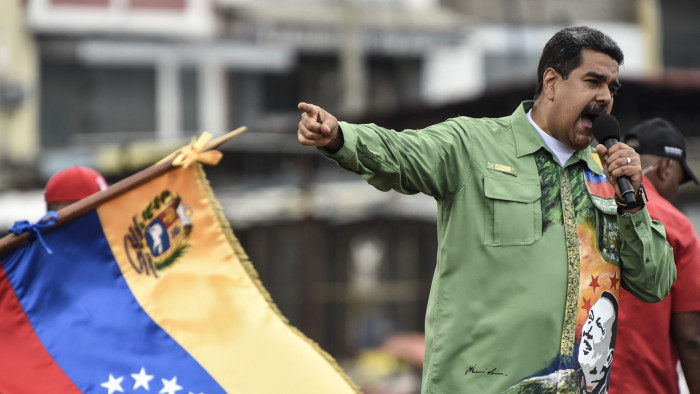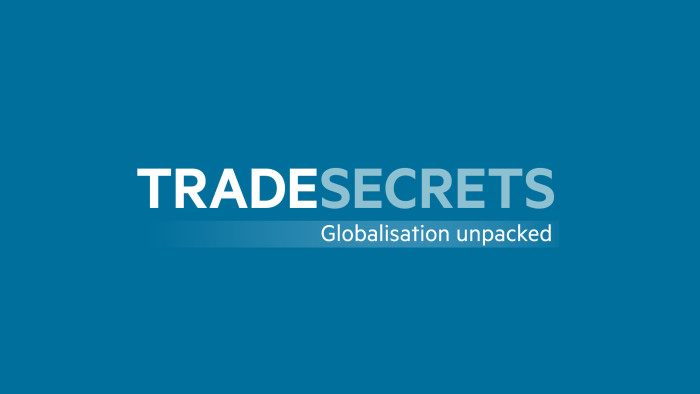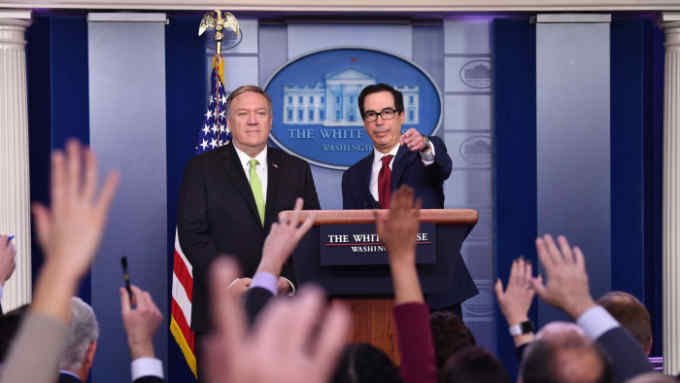Trump administration leans on sanctions to shape foreign policy

Simply sign up to the US foreign policy myFT Digest -- delivered directly to your inbox.
When Steven Mnuchin stood in the White House press briefing room three days after Iran had fired missiles at two bases hosting US forces in Iraq, in retaliation for the assassination of a top Iranian military commander, the Treasury secretary was there to lay out a crucial element of America’s response.
President Donald Trump had chosen to ramp up economic sanctions on Tehran rather than hit back with military action that might have precipitated all-out war. “The goal of our campaign is to deny the regime the resources to conduct its destructive foreign policy,” said Mr Mnuchin as he extended sanctions on members of Ayatollah Ali Khamenei’s inner circle, as well as the country’s metals and mining sectors. “We want Iran to simply behave like a normal nation.”
Mr Mnuchin’s comments, made as he stood alongside US secretary of state Mike Pompeo, reflected the extent to which economic sanctions have become the stick of choice in US foreign policy under Mr Trump — just as tariffs are its preferred punitive tool on trade. The US Treasury department says it has imposed sanctions on some 2,800 individuals, entities, vessels and aircraft under Mr Trump, and subjected more alleged terrorists to the restrictions in 2018 than in any of the past 15 years.
Even as it imposed more economic constraints on Iran, the US has this month also threatened to impose new sanctions on Iraq if it expels American troops, moved to impose restrictions on a senior official from South Sudan for alleged involvement in human rights abuses, and slapped more sanctions on current and former members of President Nicolás Maduro’s government in Venezuela.
The Trump administration’s predilection for economic sanctions comes despite criticism. There are doubts about their effectiveness, in that they often reinforce regime hardliners. There are concerns over their morality, in that they often damage the most vulnerable citizens. There is also disquiet about their long-term effects, particularly the danger that they could accelerate moves away from the dollar as a reserve currency and could force US companies to irredeemably lose market share abroad.

Mr Mnuchin is fully aware of the latter concern. “The dollar is strong because of the US economy and because . . . of the safety of the US dollar,” he said in Qatar’s capital Doha last month. “So because of that, we take sanctions responsibility very seriously — as a matter of fact, I personally sign off on every single piece of sanction that we do.”
There is no sign of a flight from the dollar for now — in the third quarter of last year, 62 per cent of the world’s allocated reserves were in US dollars, a far cry from the 20 per cent held in euros. The figure is lower than in the middle of the last decade but higher than in the aftermath of the financial crisis. Sanctions, if sustained and expanded, are considered only one factor that could precipitate a more significant drop in the influence and use of the dollar; another could be financial mismanagement in America, such as a debt crisis.
Iran is the main focus of the Trump administration’s sanctions, which were sharply ramped up following the US announcement in 2018 that it would withdraw from the 2015 nuclear deal. But Washington has also wielded its economic stick to squeeze the governments of US foes including North Korea and Venezuela.
Yet even though the regimes in Tehran, Pyongyang and Caracas remain firmly in place, Treasury officials maintain that tougher sanctions are the right policy in deterring bad behaviour and isolating countries economically and diplomatically. According to one official, there have been instances in recent years when the threat or rumour of possible sanctions have prompted foreign governments and individuals to contact the Treasury in an attempt to avoid being hit by restrictions.
One concern with Mr Trump’s fervent use of economic sanctions around the world is that it will inevitably leave a void that is likely to be filled by either Russia or China, who are increasingly reasserting themselves on the world stage as economic alternatives to the US’s traditional dominance. Washington has been trying to ramp up its development financing agency to help fund infrastructure projects around the world, but China has a head-start in many corners of the developing world, thanks to its Belt and Road Initiative.
Trade Secrets

Trade Secrets is the FT’s must-read daily briefing on the changing face of international trade and globalisation.
Sign up here to understand which countries, companies and technologies are shaping the new global economy
A second worry is that Mr Trump and Mr Mnuchin have not always been effective at persuading traditional US allies to participate in the economic sanctions, particularly the indirect, secondary sanctions that apply to third countries, which would boost their effectiveness.
After the US withdrew from the Iran nuclear pact, some EU countries set up their own payment system — called Instex — to allow business to continue with the country. But US officials have pointed out there have been no transactions via Instex so far.
There have been some cases in which Mr Mnuchin was seen to have pulled some punches on sanctions. The US Treasury secretary controversially dropped plans to impose sanctions on companies owned by Oleg Deripaska, the Russian oligarch close to Vladimir Putin. Democrats lambasted the move, forcing Mr Mnuchin to head to Capitol Hill to explain the decision in a classified briefing.
China hawks on Capitol Hill, in some foreign policy think-tanks, and even within the administration wanted Mr Mnuchin to take a tougher line with individuals and companies from that country over practices ranging from human rights violations to industrial espionage to their own violations of US sanctions. But the Trump administration has been more cautious about targeting Chinese entities, amid fears that this could further inflame tensions with Beijing as the two countries tried to settle their trade dispute.
Yet none of this has diminished the sense that one of Mr Mnuchin’s biggest legacies as Treasury secretary will be his unabating focus on sanctions, with few signs of regret. “I think we have 100 per cent confidence, and we are consistent in our view, that the economic sanctions are working,” he said of Iran. Without sanctions, he added, the country would have tens of billions of dollars that it “would be using for terrorist activities throughout the region and to enable them to do more bad things. And there’s no question, by cutting off the economics to the region, we are having an impact.”

Comments